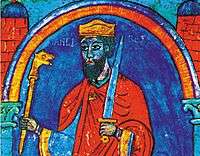Sancho I of León
| Sancho I | |
|---|---|
|
A miniature of Sancho I, from the Tumbo A in the Cathedral of Santiago de Compostela. | |
| King of León | |
| Reign | 956–958 |
| Predecessor | Ordoño III |
| Successor | Ordoño IV |
| King of León | |
| Reign | 960–966 |
| Predecessor | Ordoño IV |
| Successor | Ramiro III |
| Born | c. 935 |
| Died | c. 966 |
| Burial | Basilica of San Isidoro |
| Consort | Teresa Ansúrez |
| Issue |
Ramiro III Urraca |
| Dynasty | Astur-Leonese dynasty |
| Father | Ramiro II of León |
| Mother | Urraca Sánchez of Pamplona |
| Religion | Roman Catholicism |
Sancho I, called the Fat (c. 932 – 19 December 966) was a king of León.
Biography
He was the son of Ramiro II of León and queen Urraca Sánchez of Pamplona. He succeeded his half-brother Ordoño III in 956 and reigned until his death, except for a two-year interruption from 958 to 960, when Ordoño the Wicked usurped the throne. He was a grandson of Sancho I of Pamplona and Toda Aznárez.
At first, Sancho disputed the throne with Ordoño III who had succeeded their father in 951. Upon Ordoño's death, he took the vacant throne, but only two years later he was deposed by the nobles led by the Fernán González of Castile, because of his extreme obesity.
During his exile in Andalus, according to Dozy, Sancho managed to shed at least some portion of his girth under the treatment of Hasdai ibn Shaprut. At the same time, he began endeavoring to reclaim his throne. He first went to his grandmother Toda and asked for aid; next he concluded a treaty with the Moors and, with the help of the Leonese and Navarrese noblesse, he took Zamora in 959 and took his throne back soon afterwards.
As he did not respect his treaty with the Muslims, he experienced many punishing raids in response. The final years of his reign were characterised by the growing independence of the Castilian and Galician nobility. He was killed by poison and succeeded by his son Ramiro III.
His wife was queen Teresa Ansúrez.
References
| Wikimedia Commons has media related to Sancho I of León. |
- Reinhart Dozy, Histoire des Musulmans d'espagne (1932).
| Preceded by Ordoño III |
King of León 956–958 |
Succeeded by Ordoño IV |
| Preceded by Ordoño IV |
King of León 960–966 |
Succeeded by Ramiro III |
